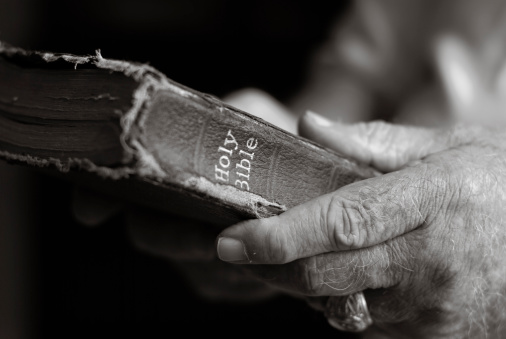Sweat Your Sermon Intro
The first pastor who really taught me about preaching once told me, “If you open strong, close strong, and hit your transitions, your sermon will take care of itself.” While it’s a bit more complicated than that, he was largely correct. Many sermons fall apart before they even start, crash and burn because of an inability to “land the plane”, or lack clarity due to confusion in transition.
While I hope to write on each of these sermon elements, I want to start with the importance of a strong sermon introduction. So what makes for an effective sermon illustration? In a sentence:
5 Prayer Requests For Preachers
Prayer is the most effective and often neglected tool in the preparation of a sermon. It should go without saying (though sadly it cannot), that the preparation of a sermon requires meditating on the text, reading commentary, studying cultural background, and the hard work of illustrating and applying God’s word in a way that’s helpful.
However, no amount of study will make up for a lack of supplication. Ingenuity won’t cover up the obvious absence of intercession for the church body. Rhetorical power is a sorry substitute for prayer-soaked proclamation.
The preacher preps the sermon, but prayer preps the preacher.
People should have a sense that their preacher has been much with God and prayer is an indispensable means of doing just that. But what should we as preachers be praying for? Here are 5 prayer requests for preachers:
11 Issues Impacting Your Preaching
When I first started preaching, I had one and only one thought on Sunday mornings:
"Don't forget what you want to say."
I walked around like I was carrying a cup of coffee that was just a little too full, afraid if someone bumped me, my sermon may spill out of my mind and onto the floor. I'm more relaxed now, yet still aware of how difficult preaching well truly is.
There are so many ways a sermon can go wrong. I know God's Word never returns void and I'm thankful that the caliber of God's work isn't determined by the quality of my preaching. Personally, I just never want that to be an excuse for phoning in a crappy sermon.
The longer I preach, the more aware I am of just how many issues impact my preaching. I can study, pray, and prepare hard and still crash and burn on Sunday - I know because I've done it. Preparation is paramount, but there are other factors in play.
Here are 11 issues that impact the preacher in no particular order...
The Preacher's Mightiest Weapon
As a preacher, I'm regularly asked how long it takes me to write a sermon. My go-to answer is, "It depends on how much I've prayed." I see a direct correlation between the quality of my preparation/preaching and the quality of my praying.
For many pastors, myself included, prayer can be the easiest aspect of sermon prep to skip. This, however, is a grave error. The preacher preps the sermon, but prayer preps the preacher. Prayer is what prepares our hearts to proclaim God's Word. Prayer is what gives preaching power in the pulpit.
Your Sermons Are Too Long
Some sermons are simply too long. There are a very few preachers in this world who can preach for more than 40 minutes without losing every listener in the room. If you read my blog, my hunch is, you’re not one of those preachers.
Sadly, in certain tribes, like the one I’m a part of, lengthy sermons are often looked at with admiration. I’ve heard pastors brag about preaching for over an hour expecting a high-five, or some sort of spiritual chest bump, but all I keep thinking is, “I get bored talking to you after 30 minutes, I can’t imagine listening to you preach for an hour!”
7 Reasons People Might Hate Our Preaching...
Every preacher knows the discouragement of looking out on an obviously disengaged audience - glassy stares, confused looks, slowly closing eyes just moments from a nap - it's awful. While some of the responsibility lands in the laps of our listeners, most of the responsibility is ours as preachers.
Our job is to "rightly handle the word of truth" (2 Tim.2:15). That's the command the apostle Paul gave young Timothy - a green, insecure, uncertain pastor in a jacked up situation.
I am part of a tribe that takes this task seriously. We preach the Word week in and week out. We don't play games with God's Word. But, if we're not careful we can make the mistake of believing that faithful preaching means nothing more than mere accuracy. I believe Paul's encouragement to Timothy begs more than accuracy alone.
Here are seven reasons people might hate our preaching (even if it's Biblically accurate)…
6 Steps To Prep A Sermon Start To Finish
D. Martyn Lloyd-Jones said, “The work of preaching is the highest and the greatest and the most glorious calling to which anyone can ever be called.” I’m so thankful to be a preacher. It’s my favorite part of being a pastor. While I love the act of preaching, I often find the art of prepping sermons tedious. I love to study and preach what the Lord gives me. It’s the blood, sweat, and tears in between that makes me long for the time when I was a vocational coffee maker.
Seinfeld & Sermon Prep
Sermon prep is difficult work. It’s long, arduous, and tedious. Because of the difficulty inherent to prepping a gospel-centered, culturally-intelligible, Biblically-saturated sermon, many opt for other types of “sermons.” Some preach creativity.
Some preach comedy.
Some preach social observations.
Some preach practical pep-talks.
It’s simply easier to “preach” these other things than it is to open God’s Word each week, find a fresh sermon for God’s people, and put spiritual food on the table.
Recovering From Preaching
Preaching is draining work. A faithful Bible preacher labors week after week to carefully and prayerfully craft sermons in a way that are faithful, helpful, and clear.
All the while they see the faces of actual people God has entrusted to their care. They see their victories, their trials, their suffering, and their sin. They hear their fears, doubts, and their prayers. All of this adds to the weight of bringing a word from God that will build them up, encourage them, feed them, and challenge them.
Why I Read Christian Biographies
I love reading the stories of those God has used throughout history. The diversity of those He uses is staggering. There is no one personality type, ministry philosophy, nor theological tribe God has been limited to. All of this serves to make much of God and breed humility in us.
Outside the Bible, biographies of the people God has used to make a lasting impact tend to be my favorite reading. The stories of Martin Luther, John Calvin, Jonathan Edwards, D.L. Moody, C.H. Spurgeon, and A.W. Tozer have all served my soul, my marriage, and my ministry. Besides the amazing nature of these stories, there are three primary reasons I read these great books:







